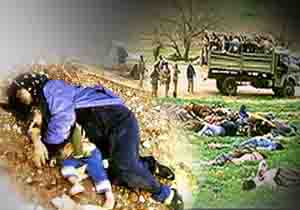Violence and instability have continued in Iraq throughout the last decade.
Indeed Iraqi people have suffered a lot not only as victims of the brutal regime of Saddam Hussein but  also after Saddam at the hands of US-led Western governments who are more concerned with access to the regional oil resources and with perceived strategic interests other than human welfare and also by extremist groups taking over parts of the country . Although the government of Iraq is trying hard to stabilize the country it still has problem confronting terrorists.
also after Saddam at the hands of US-led Western governments who are more concerned with access to the regional oil resources and with perceived strategic interests other than human welfare and also by extremist groups taking over parts of the country . Although the government of Iraq is trying hard to stabilize the country it still has problem confronting terrorists.
Although Iraq has experienced many bloody days in both Saddam and post Saddam era, still some days remain stronger in the historical memory of the people. April is indicative of the al-Anfal notorious operations by Baath regime against Kurds that killed at least 50,000 civilians and destroyed thousands of villages. April 14 is now the national day of remembrance for those killed in al-Anfal.
al-Anfal is not the only operations Saddam Hussein launched against the Kurds.
In April 1991, after Saddam lost control of Kuwait in the Persian Gulf War, he cracked down ruthlessly against several uprisings in the Kurdish north and the Shia South.
Mujahedin Khalq who had made common cause with Saddam Hussein served as part of Saddam’s internal security operation and hand in hand with Hussein forces committed full-scale massacres and other gross human rights violations. The death estimate during that time range from 20,000 to 100,000 for Kurds, and 60,000 to 130,000 for Shi’ites.[1]
Though the MKO has tried outrageously to deny helping Saddam in his crackdown on the Kurds, many eyewitnesses testified on this fact.
Fox news quoted a Kurdish English teacher who was in Kifri when the MKO mobilized against his town in 1991.Safir recalled how the MKO shelled Kurdish towns”at random,”took locals hostage, and in one incident attacked a busload of young people from Kifri, killing all 20.[2]
After the Swedish Parliament in a majority vote formally recognized the Anfal Operation as genocide and crimes against humanity in early December 2012, some defected members of the terrorist Mojahedin Khalq Organization voiced their preparedness to give a testimony before the Swedish parliament about MKO’s key role in the massacre of Iraqi Kurds.[3]
The United States Department of State and the Foreign Affairs group of the Parliament of Australia also asserted the MKO’s assistance to Baath regime brutal suppression of the uprisings.[4][5]
Iraqi authorities have issued 148 arrest warrants for MEK members for crimes against Iraqis since 1991 but none have been arrested, according to officials. Maryam Rajavi was also included in the warrants. [6]Maryam Rajavi has been reported by former MKO members as having said,”Take the Kurds under your tanks, and save your bullets for the Iranian Revolutionary Guards.”[7]
The crimes against humanity the group committed in Iraq, beside its frequent interference in the internal affairs of the country and group war mongering attitudes has incurred a seated-hatred of the Iraqi people toward the group members. The hatred which may lead to revenge as it had been the case during last year. 4 rocket attacks launched against the TTL caused the death and injury of several Liberty residents. And the Camp Ashraf September1th clashes caused the killing of 52 members.
Beside the dangers which threats the Camp Liberty residents from outside the Camp, they are under the menace of the group members within the affairs of the cult as Rajavi has ordered a new- though accustomed- decree based on which members are required to sign papers and declare their readiness to emblaze themselves in case of Camp Liberty evacuation.[8]
So what can really be a wake-up call for the international community to prevent a disaster and save 3000 lives?
By A.Sepinoud
[1] Human Rights Watch, ENDLESS TORMENT, The 1991 Uprising in Iraq And Its Aftermath, September25, 2009
[2] Foxnews, Iranian Militant MeK Group Losing Fight to Stay in Iraq, January12, 2009
[3] Open Salon,Suppression of Kurds a crime against humanity,January30,2013
[4] Graff, James, Iran’s Armed Opposition Wins a Battle — In Court, Time Magazine, April 28, 2011
[5] Department of the Parliamentary Library, Australian Parliament, Research Note, No. 43,Behind the Mujahideen-e-Khalq (MeK), June 16, 2003
[6]al-Salhy, Suadad ,Iraq says no success tracing killers of Iranian dissidents, Reuters, Nov 27, 2013
[7] Rubin, Elizabeth, The Cult of Rajavi, NewYork Times, August 5, 2009
[8] https://www.nejatngo.org/en/posts/5656

